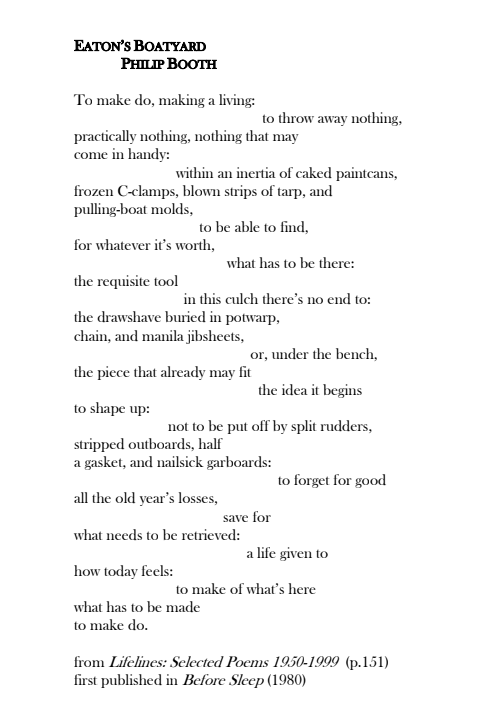"Eaton's Boatyard" by Philip Booth
May 26, 2022 - Anne Witty is a poet and writer, museum professional, and sailor. She lives in mid-coast Maine. For her Read & Loved selection she highlights Maine raised poet Philip Booth’s poem “Eaton's Boatyard” which appears in his book Lifelines: Selected Poems 1950-1999 on page 151. Witty has this to say about the piece:
“Culch: it is what it sounds like: not an abbreviation for “culture,” that overused and slippery term, but an oyster bed of broken shells, stones, and debris. There the tiny waterborne spat, baby oysters-in-the-making, can latch on and grow. The word is used around New England for general materials jumbled together, a purposeful clutter.
Poems, too, grow from culch: those accumulated ideas, jottings, notebooks, memories. A poet is a thrifty artisan much like the unseen proprietor in Philip Booth’s poem “Eaton’s Boatyard,” which opens: “To make do, making a living:/ to throw away nothing, practically nothing, nothing that may/ come in handy:”
Booth asks us to stop and contemplate the people and customs of a coastal Maine that was changing away from traditional life even when “Eaton’s Boatyard” was published, in 1980. I was hooked right away, recalling the dozens of boatshops and people I’ve visited as a museum curator looking into past and present maritime communities. But Booth also speaks as a poet when he writes of the knack “to be able to find, / for whatever it’s worth,/what has to be there:/the requisite tool/ in this culch there’s no end to:”
Amid evocative boatyard details like the “drawshave buried in potwarp,” what emerges from the poem is a useful philosophy, an ars poetica: “. . . to forget for good/ all the old year’s losses,/ save for/what needs to be retrieved:/ a life given to/ how today feels:/ to make of what’s here/ what has to be made/to make do.”
Making a living, whatever we choose to do, inevitably generates detritus. Yet making a life emerges from stirring our own mixture of accumulated experience and extracting what’s useful. “Eaton’s Boatyard” reminds us to look again for that “the piece that already may fit/ the idea it begins/ to shape up:”
To submit your own Read & Loved feature of a “hidden gem by a Maine author” visit our form here


